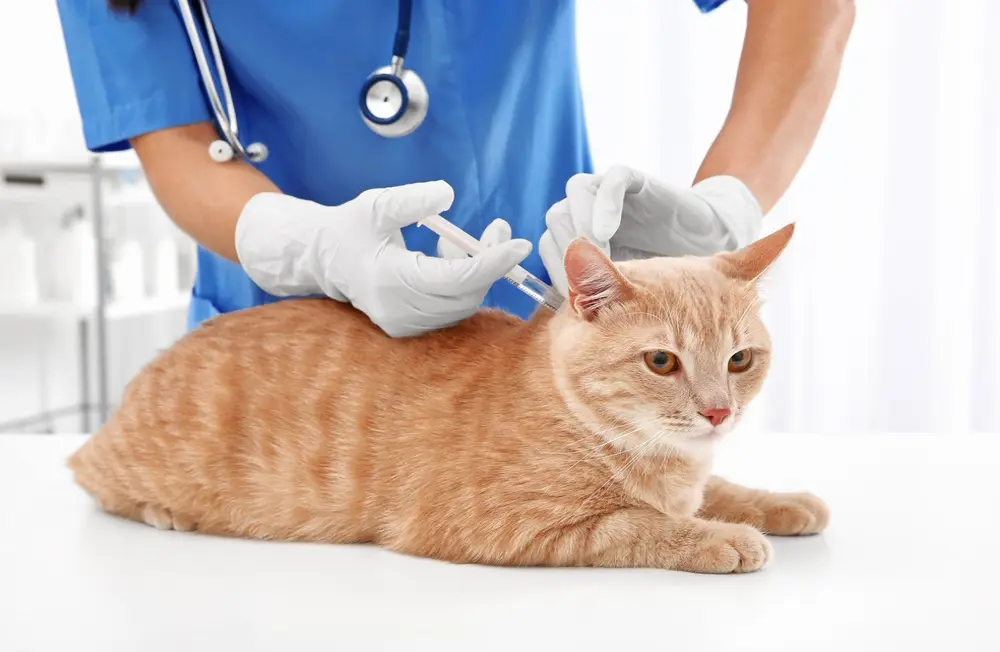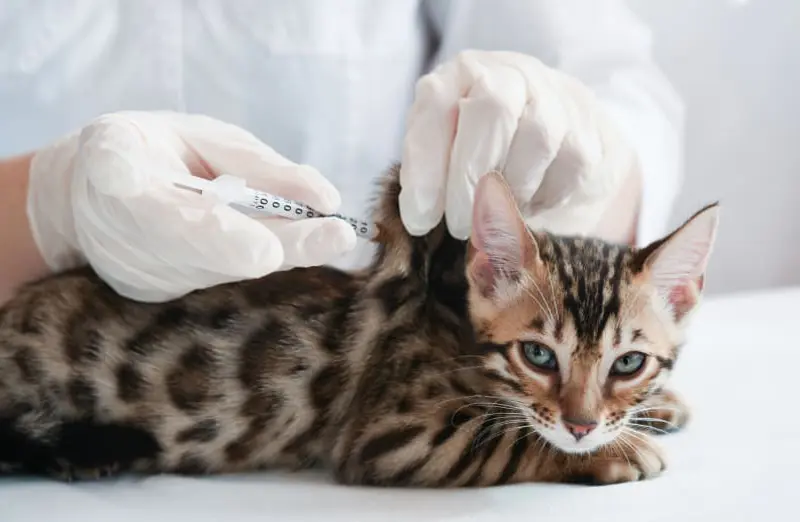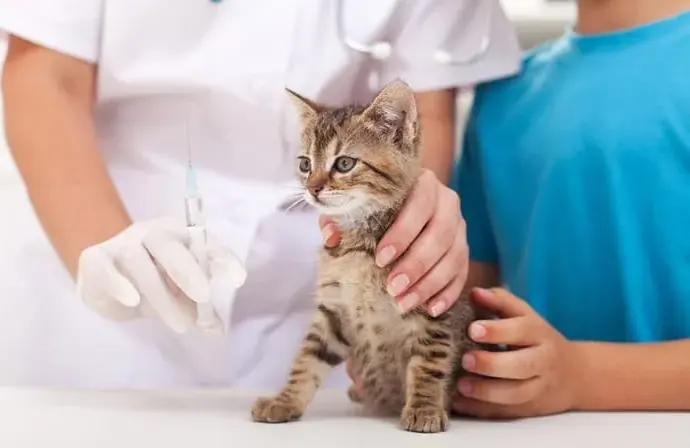What Vaccinations Does Your Cat Need?

Introduction
Caring for your cat’s health means giving them the right vaccinations. These tiny shots help protect your furry friend from harmful diseases. Let’s explore the different vaccinations available for cats.
A. Brief Overview of the Importance of Vaccinations for Cats
Vaccinations are like superheroes for your cat’s immune system. They train the body to fight off dangerous illnesses before they can even start. Without vaccines, cats are more vulnerable to sicknesses that could make them very sick or even cause death.
B. Introduction to the Various Vaccinations Available for Cats
Just like humans, cats need different vaccines to stay healthy. Some of the most important ones protect against diseases like rabies, feline leukemia, and distemper. Each vaccine targets a specific threat to keep your cat safe and happy. Let’s dive into each one to understand how they work.

Core Vaccinations
Core vaccinations are the crucial shots that every cat needs to stay healthy. They protect against serious diseases that can be life-threatening. Let’s delve into what these core vaccinations are and why they’re so important.
A. Definition and Importance of Core Vaccinations
Core vaccinations are like the foundation of a strong fortress for your cat’s health. They guard against the most common and dangerous diseases that all cats can encounter. By getting these shots, you’re giving your furry friend a sturdy shield against illness.
B. Overview of the Specific Core Vaccinations Recommended for Cats
- Rabies Vaccine: Rabies is a deadly virus that can spread through the bite of infected animals, including bats and raccoons. The rabies vaccine protects your cat from this dangerous disease, ensuring their safety and the safety of those around them.
- Feline Distemper (Panleukopenia) Vaccine: Feline distemper, also known as panleukopenia, is a highly contagious and often fatal disease. The vaccine against feline distemper helps your cat’s immune system recognize and fight off the virus, preventing severe illness.
- Feline Viral Rhinotracheitis (Herpesvirus) Vaccine: This vaccine protects against a common respiratory infection caused by the feline herpes virus. It helps prevent symptoms like sneezing, nasal discharge, and fever, keeping your cat comfortable and healthy.
- Feline Calicivirus Vaccine: Feline calicivirus is another respiratory infection that can cause severe symptoms like mouth ulcers and difficulty breathing. The vaccine safeguards your cat against this virus, reducing the risk of illness and discomfort.
C. Explanation of Why These Vaccinations Are Considered Essential
These core vaccinations are essential because they shield your cat from diseases that are not only dangerous but also widespread. By ensuring your cat is up-to-date on these shots, you’re providing them with the best possible protection against serious illnesses that could threaten their life and well-being.

Non-Core Vaccinations
Non-core vaccinations are additional shots that your cat might need depending on their lifestyle and risk factors. While not essential for every cat, they provide extra protection against specific diseases. Let’s explore what these non-core vaccinations are and when they might be necessary.
A. Definition and Purpose of Non-Core Vaccinations
Non-core vaccinations are like extra armor for your cat’s immune system. They target diseases that are less common but might still pose a threat depending on your cat’s lifestyle and environment. These shots are tailored to provide specialized protection based on individual needs.
B. Overview of Non-Core Vaccinations That May Be Recommended Based on Lifestyle and Risk Factors
- Feline Leukemia Virus (FeLV) Vaccine: FeLV is a contagious virus that can weaken your cat’s immune system and lead to serious health problems, including cancer. The FeLV vaccine is recommended for cats who spend time outdoors or live with other cats, as they are at higher risk of exposure.
- Feline Immunodeficiency Virus (FIV) Vaccine: FIV is similar to HIV in humans and can weaken your cat’s immune system, making them more susceptible to infections. The FIV vaccine is typically recommended for outdoor cats or those who may come into contact with infected cats.
- Chlamydia Vaccine: Chlamydia is a bacterial infection that can cause respiratory symptoms and eye problems in cats. The chlamydia vaccine may be recommended for cats in multi-cat households or those in high-risk environments, such as shelters.
C. Explanation of When and Why These Vaccinations Might Be Administered
These non-core vaccinations are usually recommended based on your cat’s lifestyle and potential exposure to certain diseases. For example, if your cat spends a lot of time outdoors or interacts with other cats, they may be at higher risk and could benefit from these additional vaccinations. Your veterinarian will assess your cat’s individual needs and recommend the appropriate vaccinations to keep them healthy and protected.
Vaccination Schedule
Keeping up with your cat’s vaccination schedule is crucial for their health and well-being. Let’s break down the typical schedule for kittens, the importance of booster shots, and how vaccinations continue into adulthood.
A. Explanation of the Typical Vaccination Schedule for Kittens
Kittens usually start their vaccination journey around 6 to 8 weeks old. They’ll need a series of shots over several weeks to build up their immunity. These shots protect them from common diseases like distemper and respiratory infections.
B. Discussion of the Importance of Booster Shots for Maintaining Immunity
After the initial round of shots, kittens need booster shots to keep their immunity strong. Boosters help reinforce their body’s defenses against diseases. Without boosters, their protection could weaken over time, leaving them vulnerable to illness.
C. Overview of the Vaccination Schedule for Adult Cats
Once your cat reaches adulthood, they’ll still need regular vaccinations to stay protected. The exact schedule may vary depending on factors like their lifestyle and risk of exposure to certain diseases. Your vet will create a personalized plan to keep your cat up-to-date on their shots.
D. Importance of Regular Veterinary Check-ups for Vaccination Updates
Regular check-ups with your veterinarian are essential for ensuring your cat’s vaccinations are always current. Your vet will monitor your cat’s health and recommend any necessary updates or additional vaccinations based on changes in their lifestyle or new disease threats in your area. Keeping up with these check-ups helps ensure your cat stays healthy and protected for years to come.
Risks and Benefits
Understanding the risks and benefits of vaccinations is important for making informed decisions about your cat’s health. Let’s explore the potential downsides, the valuable protection vaccinations offer, and how to make the best choices with your vet.
A. Discussion of Potential Risks Associated with Vaccinations in Cats
While vaccinations are generally safe, there can be some risks, such as mild reactions like soreness or swelling at the injection site. In rare cases, more serious reactions may occur, but these are very uncommon and often outweighed by the benefits of vaccination.
B. Overview of the Benefits of Vaccinations in Preventing Serious Diseases
The benefits of vaccinations for your cat are immense. They help prevent serious and sometimes fatal diseases like rabies, distemper, and feline leukemia. Vaccinations give your cat’s immune system the upper hand in fighting off these dangerous illnesses, keeping them healthy and happy.
C. Explanation of How to Weigh Risks Versus Benefits in Consultation with a Veterinarian
When it comes to deciding whether to vaccinate your cat, it’s crucial to consult with your veterinarian. They can assess your cat’s individual health and lifestyle factors to determine the best course of action. Your vet will help you weigh the potential risks of vaccination against the benefits of protecting your cat from potentially life-threatening diseases. Together, you can make an informed decision that prioritizes your cat’s health and well-being.
Special Considerations
Special circumstances can influence the vaccination needs of cats. Whether they’re indoor or outdoor, living in a multi-cat household, or residing in different regions, various factors come into play.
A. Discussion of Special Considerations for Indoor versus Outdoor Cats
Indoor cats may have lower exposure to certain diseases compared to outdoor cats, but they still need vaccinations. Outdoor cats are at higher risk of encountering infectious agents, so they require additional protection to stay healthy.
B. Overview of Considerations for Multi-Cat Households
In multi-cat households, diseases can spread more easily among feline companions. Close contact increases the risk of transmission, making it crucial for all cats to be up-to-date on their vaccinations to prevent outbreaks and keep everyone safe.
C. Explanation of How Vaccination Needs May Vary Based on Geographic Location and Local Disease Prevalence
The prevalence of certain diseases can vary depending on where you live. For example, areas with higher populations of wildlife may have a greater risk of rabies, while regions with dense cat populations might see more cases of feline leukemia. Your veterinarian will consider these factors when recommending vaccinations tailored to your cat’s specific environment, ensuring they receive the necessary protection against local threats.
Conclusion
In wrapping up our discussion, let’s revisit why vaccinations are crucial for your cat’s health, highlight the importance of consulting with a veterinarian, and emphasize the vital role vaccinations play in keeping our feline friends safe and healthy.
A. Recap of the Importance of Vaccinations for Cats
Vaccinations are like shields that protect your cat from serious and potentially life-threatening diseases. They train your cat’s immune system to recognize and fight off harmful invaders, keeping them safe from illness.
B. Encouragement for Cat Owners to Consult with Their Veterinarians to Develop an Appropriate Vaccination Plan
Every cat is unique, and their vaccination needs may vary based on factors like age, lifestyle, and environment. That’s why it’s essential to work closely with your veterinarian to create a tailored vaccination plan that meets your cat’s individual needs.
C. Final Thoughts on the Role of Vaccinations in Keeping Cats Healthy and Protected
Vaccinations are a cornerstone of preventive healthcare for cats. By staying up-to-date on vaccinations and following your veterinarian’s guidance, you’re taking proactive steps to ensure your cat enjoys a long, healthy, and happy life free from preventable diseases.
People also ask
What vaccine is necessary for cats?
Core vaccines like rabies and distemper are necessary for all cats to protect against common diseases.
What immunizations do cats need?
Cats need immunizations against diseases like rabies, distemper, and respiratory infections.
Do indoor cats need vaccines?
Yes, indoor cats still need vaccines to protect against diseases they may encounter.
What does the 4-in-1 vaccine for cats protect against?
The 4-in-1 vaccine typically protects against feline distemper, calicivirus, rhinotracheitis, and chlamydia.
What are the consequences of not vaccinating my indoor cat?
Without vaccines, your indoor cat is at risk of contracting preventable diseases.
Do cats need shots every year?
They may not need shots yearly; your vet will determine the appropriate schedule.



